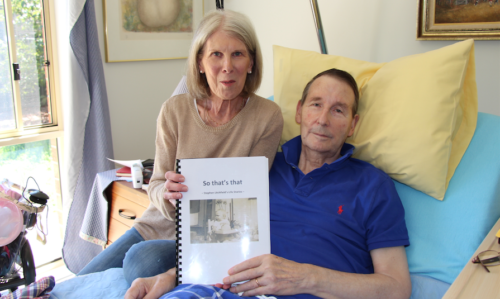
Despite its best efforts, Palliative Care ACT is struggling to find support to keep the program, which lets people who are at the end of their lives tell their stories, going.
“There are many great causes relying on community, corporate and philanthropic support,” says general manager Julie Elliott.
“At this point in time, understandably, people are being very generous by funding fire recovery initiatives.”
But Julie, and Palliative Care ACT, are hoping there are businesses or individuals around who can support this program.
The volunteer-run service needs $20,000 a year to continue to flourish, says Julie.
“We will do everything we can to keep the program operating,” she says.
“Where there is no longer a hope for a cure [Life Stories offers] healing of a different kind.”
Through voice-recorded sessions with a Palliative Care ACT volunteer, the program produces transcribed stories in the voices of the person who is at the end of their life.
“[It] is a healing therapy which can play a part in reviewing a client’s life helping them see the bigger picture and reminding them of who they are and what they have done,” Julie says.

“The process enables them to reflect on how their lives have mattered.
“The benefit to the client, and the memories they leave their loved ones, is priceless.”
Joanna Litchfield, whose husband Stephen just finished writing his story with a Palliative Care ACT volunteer, says she loved reading the book.
“I absolutely hooted and burst into tears because it’s all his own words and you can see and hear him saying it,” says Joanna, 72, of Nicholls.
Stephen, 76, who has the progressive neurodegenerative disorder Multiple System Atrophy (MSA) says it’s a very worthwhile program for the person doing it.
He is one of 50 people in Canberra that have completed the program, with about 12 on the go now.
“It’s an incredibly worthwhile program for two reasons,” he says.
“What it does is it helps people who are dying to give them a bit of grounding. But also for the families, it just brings people together.”
The reason Stephen wanted to participate was because not too many people knew about his early life.
Stephen says he remembers things only few people would remember like how they used to trap rabbits and lots of other things that have been lost.
“What’s been lost has now been written down,” he says.
“I grew up during World War II in a different time back when my father was away in the war.
“I didn’t have an easy life because my father [while he was] a lovely man was reasonably difficult.
“The war took an enormous amount out of him. It wasn’t until I wrote this story that I really appreciated it all.
“When you get to a stage where you’re told you’re dying and there’s no cure, you start thinking.”
But Stephen’s story is not just about his childhood, and in the spiral-bound book he speaks about his 20 years in the public service, which saw him as the principal private secretary to former federal minister Peter Nixon, as the state director for the NSW and Queensland divisions of the Liberal Party, secretary of the royal commission into land tenures and joining the Prime Minister’s staff just as Harold Holt disappeared in 1967.
During his long career, Stephen says he also had the chance to dance with Princess Anne and have dinner with the Queen.
After seeing Stephen lifted by the process, Joanna says she wants the program to continue so more people can have that experience.
“You could hear them giggling. It was so much fun and he loved it,” she says.
“If his children allow their children to read it, and they let their children and great grandchildren, they will know him intimately without knowing him.
“It’s a wonderful thing. It really keeps people who have gone alive.”
Despite the program’s uncertainty, the program coordinator of Life Stories, Liz Rhodes, says they are still taking referrals for people who want to participate, and referrals can come from anywhere, whether it’s neighbours or a nurse.
“We will bake cookies if that’s what it takes to keep the program running,” she says.
People who want to support the program can call 6255 5771 or email office@pallcareact.org.au
Who can be trusted?
In a world of spin and confusion, there’s never been a more important time to support independent journalism in Canberra.
If you trust our work online and want to enforce the power of independent voices, I invite you to make a small contribution.
Every dollar of support is invested back into our journalism to help keep citynews.com.au strong and free.
Thank you,
Ian Meikle, editor









Leave a Reply